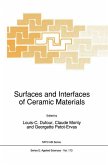One area of science that has shown an explosive growth over the last few decades is materials science. Inherently by nature products of both basic and applied research, materials make possible life and society as we know it today. Materials, ranging from ceramics to semiconductors to composites, are such that new ones must not only be designed and made ... they must also be characterized in terms of their physical, chemical, and mechanical properties. Thus, many new state of-the-art techniques involving spectroscopy, microscopy, and other approaches are now routinely used. Modem materials have wide applications in many sectors of technology. Films, for example, constitute an enormous area of materials and are used extensively. Films in tum can be integrated with other systems such as superconducting metal oxides and organic superconductors. Additionally, ceramics can also be synthesized and fabricated as films for different applications. Catalysts, too, can vary widely in both composition and form. The number of applications for catalysts in industry must easily rank as one of the highest number of applications for any class of materials. Catalysis is impOltant for a wide range of activities in industry, from petroleum refining to the synthesis of a large number of industrial feedstock materials. Researchers in this area of materials are constantly trying to unravel new approaches to making better catalysts.
Bitte wählen Sie Ihr Anliegen aus.
Rechnungen
Retourenschein anfordern
Bestellstatus
Storno








